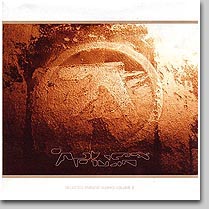
'Selected Ambient Works Vol II' by Simon Reynolds
 By now you may have heard of Richard James, the British techno whiz-kid who sleeps two hours a night and who is so prolific he needs a host of pseudonyms (the most famous being Aphex Twin and Polygon Window) to unleash his monstrous creativity. Released at the start of '93, Aphex's Selected Ambient Works 1985-92 was the flagship of the emergent genre of ambient techno, undeniable proof that techno was blossoming into a new form of electronic composition. Since then, ambient has too often proved to be mere Muzak, a soothing sound-bath for burned-out ravers. And so, for his sequel, Selected Ambient Works Part II, James has veered away from chill-out toward a more chilling direction. This triple LP/double CD will leave you not so much blissed out as spooked out. That said, there's still plenty of the shimmeringly euphoric and majestically melancholy tunes that have won James so many devout fans. Like Track Nine of Album Two (none of the pieces are titled), a tantalizing, tingle-making skein of sonic dew-drops, or my favorite, Track Three/Album One. Here, it's the restraint of James''s music that paradoxically induces such an unrestrained emotional response in the listener (a flood of tears). Track Three/Album Three drapes an ice-cream truck melody as naively idyllic as Erik Satie over uptempo beats, while Track Four is "cosmic pastoral", a space-age take on 19th-century symphonic music. But if Selected Ambient Works Part II is "classical techno", it's real reference points are late-20th century avant-garde ideas. James' techniques parallel those of the post-John Cage minimalists and such musique concrete/electro-acoustic composers as Stockhausen. As with Cage's percussive and prepared piano pieces, James is more interested in timbre than melody. His motifs are simple, sometimes trite, because their real role is foregrounding the materiality of sound-in-itself: textures so exotic or unearthly you want to cares or lick them. Where so much electronic music reeks of hygiene, you're rarely conscious that James is using analog synths, samplers, and sequencers; more often, it's like he's playing acoustic instruments from the distant future or an alien civilization. On the rare occasion that beats appear, they tend to be eccentric (Track One/Album Three is like a three-legged man trying to samba). This dearth of danceability, along with the somber, forbidding aura of most of the tracks, may alienate some of James's fans. But even the most out-there stuff here is appallingly beautiful. Don't hesistate to embrace the future.
By now you may have heard of Richard James, the British techno whiz-kid who sleeps two hours a night and who is so prolific he needs a host of pseudonyms (the most famous being Aphex Twin and Polygon Window) to unleash his monstrous creativity. Released at the start of '93, Aphex's Selected Ambient Works 1985-92 was the flagship of the emergent genre of ambient techno, undeniable proof that techno was blossoming into a new form of electronic composition. Since then, ambient has too often proved to be mere Muzak, a soothing sound-bath for burned-out ravers. And so, for his sequel, Selected Ambient Works Part II, James has veered away from chill-out toward a more chilling direction. This triple LP/double CD will leave you not so much blissed out as spooked out. That said, there's still plenty of the shimmeringly euphoric and majestically melancholy tunes that have won James so many devout fans. Like Track Nine of Album Two (none of the pieces are titled), a tantalizing, tingle-making skein of sonic dew-drops, or my favorite, Track Three/Album One. Here, it's the restraint of James''s music that paradoxically induces such an unrestrained emotional response in the listener (a flood of tears). Track Three/Album Three drapes an ice-cream truck melody as naively idyllic as Erik Satie over uptempo beats, while Track Four is "cosmic pastoral", a space-age take on 19th-century symphonic music. But if Selected Ambient Works Part II is "classical techno", it's real reference points are late-20th century avant-garde ideas. James' techniques parallel those of the post-John Cage minimalists and such musique concrete/electro-acoustic composers as Stockhausen. As with Cage's percussive and prepared piano pieces, James is more interested in timbre than melody. His motifs are simple, sometimes trite, because their real role is foregrounding the materiality of sound-in-itself: textures so exotic or unearthly you want to cares or lick them. Where so much electronic music reeks of hygiene, you're rarely conscious that James is using analog synths, samplers, and sequencers; more often, it's like he's playing acoustic instruments from the distant future or an alien civilization. On the rare occasion that beats appear, they tend to be eccentric (Track One/Album Three is like a three-legged man trying to samba). This dearth of danceability, along with the somber, forbidding aura of most of the tracks, may alienate some of James's fans. But even the most out-there stuff here is appallingly beautiful. Don't hesistate to embrace the future.Review written by: Simon Reynolds, SPIN